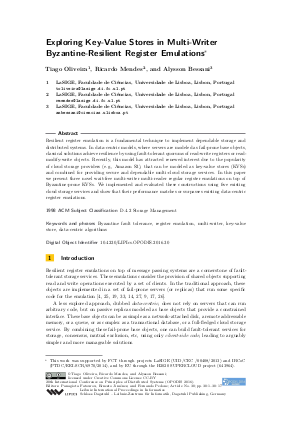Exploring Key-Value Stores in Multi-Writer Byzantine-Resilient Register Emulations
Authors Tiago Oliveira, Ricardo Mendes, Alysson Bessani
-
Part of:
Volume:
20th International Conference on Principles of Distributed Systems (OPODIS 2016)
Part of: Series: Leibniz International Proceedings in Informatics (LIPIcs)
Part of: Conference: International Conference on Principles of Distributed Systems (OPODIS) - License:
 Creative Commons Attribution 3.0 Unported license
Creative Commons Attribution 3.0 Unported license
- Publication Date: 2017-04-06
File

PDF
LIPIcs.OPODIS.2016.30.pdf
- Filesize: 0.61 MB
- 17 pages
Document Identifiers
Subject Classification
Keywords
- Byzantine fault tolerance
- register emulation
- multi-writer
- key-value store
- data-centric algorithms
Metrics
- Access Statistics
-
Total Accesses (updated on a weekly basis)
0Document
0Metadata
Abstract
Resilient register emulation is a fundamental technique to implement dependable storage and distributed systems. In data-centric models, where servers are modeled as fail-prone base objects, classical solutions achieve resilience by using fault-tolerant quorums of read-write registers or read-modify-write objects. Recently, this model has attracted renewed interest due to the popularity of cloud storage providers (e.g., Amazon S3), that can be modeled as key-value stores (KVSs) and combined for providing secure and dependable multi-cloud storage services. In this paper we present three novel wait-free multi-writer multi-reader regular register emulations on top of Byzantine-prone KVSs. We implemented and evaluated these constructions using five existing cloud storage services and show that their performance matches or surpasses existing data-centric register emulations.
Cite As Get BibTex
Tiago Oliveira, Ricardo Mendes, and Alysson Bessani. Exploring Key-Value Stores in Multi-Writer Byzantine-Resilient Register Emulations. In 20th International Conference on Principles of Distributed Systems (OPODIS 2016). Leibniz International Proceedings in Informatics (LIPIcs), Volume 70, pp. 30:1-30:17, Schloss Dagstuhl – Leibniz-Zentrum für Informatik (2017)
https://doi.org/10.4230/LIPIcs.OPODIS.2016.30
BibTex
@InProceedings{oliveira_et_al:LIPIcs.OPODIS.2016.30,
author = {Oliveira, Tiago and Mendes, Ricardo and Bessani, Alysson},
title = {{Exploring Key-Value Stores in Multi-Writer Byzantine-Resilient Register Emulations}},
booktitle = {20th International Conference on Principles of Distributed Systems (OPODIS 2016)},
pages = {30:1--30:17},
series = {Leibniz International Proceedings in Informatics (LIPIcs)},
ISBN = {978-3-95977-031-6},
ISSN = {1868-8969},
year = {2017},
volume = {70},
editor = {Fatourou, Panagiota and Jim\'{e}nez, Ernesto and Pedone, Fernando},
publisher = {Schloss Dagstuhl -- Leibniz-Zentrum f{\"u}r Informatik},
address = {Dagstuhl, Germany},
URL = {https://drops.dagstuhl.de/entities/document/10.4230/LIPIcs.OPODIS.2016.30},
URN = {urn:nbn:de:0030-drops-70999},
doi = {10.4230/LIPIcs.OPODIS.2016.30},
annote = {Keywords: Byzantine fault tolerance, register emulation, multi-writer, key-value store, data-centric algorithms}
}
Author Details
References
-
I. Abraham, G. Chockler, I. Keidar, and D. Malkhi. Byzantine disk Paxos: optimal resilience with Byzantine shared memory. Distributed Computing, 18(5), 2006.

-
M. Aguilera, B. Englert, and E. Gafni. On using network attached disks as shared memory. In Proc. of the PODC, 2003.

- Amazon S3. URL: http://aws.amazon.com/s3/.
-
H. Attiya, A. Bar-Noy, and D. Dolev. Sharing memory robustly in message-passing systems. Journal of the ACM, 42(1), 1995.

-
C. Basescu et al. Robust data sharing with key-value stores. In Proc. of the DSN, 2012.

-
A. Bessani, M. Correia, B. Quaresma, F. Andre, and P. Sousa. DepSky: Dependable and secure storage in cloud-of-clouds. ACM Transactions on Storage, 9(4), 2013.

-
A. Bessani, R. Mendes, T. Oliveira, N. Neves, M. Correia, M. Pasin, and P. Verissimo. SCFS: a shared cloud-backed file system. In Proc. of the USENIX ATC, 2014.

-
C. Cachin, B. Junker, and A. Sorniotti. On limitations of using cloud storage for data replication. In Proc. of the WRAITS, 2012.

-
C. Cachin and S. Tessaro. Optimal resilience for erasure-coded Byzantine distributed storage. In Proc. of the DSN, 2006.

-
B. Calder et al. Windows Azure storage: a highly available cloud storage service with strong consistency. In Proc. of the SOSP, 2011.

-
G. Chockler, D. Dobre, A. Shraer, and A. Spiegelman. Space bounds for reliable multi-writer data store: Inherent cost of read/write primitives. In Proc. of the PODC, 2016.

-
G. Chockler and D. Malkhi. Active disk paxos with infinitely many processes. Distributed Computing, 18(1), 2005.

- DepSky webpage. URL: http://cloud-of-clouds.github.io/depsky/.
-
D. Dobre, G. O. Karame, W. Li, M. Majuntke, N. Suri, and M. Vukolic. Powerstore: Proofs of writing for efficient and robust storage. In Proc. of the CCS, 2013.

-
E. Gafni and L. Lamport. Disk paxos. Distributed Computing, 16(1), 2003.

-
G. Gibson et al. A cost-effective, high-bandwidth storage architecture. In Proc. of the ASPLOS, 1998.

-
G. Goodson, J. Wylie, G. Ganger, and M. Reiter. Efficient Byzantine-tolerant erasure-coded storage. In Proc. of the DSN, 2004.

- Google storage. URL: https://developers.google.com/storage/.
-
J. Hendricks, G. R. Ganger, and M. K. Reiter. Low-overhead Byzantine fault-tolerant storage. In Proc. of the SOSP, 2007.

-
M. Herlihy. Wait-free synchronization. ACM Transactions on Programming Languages and Systems, 13(1), 1991.

-
P. Jayanti, T. D. Chandra, and S. Toueg. Fault-tolerant wait-free shared objects. Journal of the ACM, 45(3), 1998.

-
Hugo Krawczyk. Secret sharing made short. In Proc. of the CRYPTO, 1993.

-
L. Lamport. On interprocess communication (part II). Distributed Computing, 1(1), 1986.

-
R. Los, D. Shacklenford, and B. Sullivan. The notorious nine: Cloud Computing Top Threats in 2013. Technical report, Cloud Security Alliance (CSA), February 2013.

-
D. Malkhi and M. Reiter. Byzantine quorum systems. Distributed Computing, 11(4), 1998.

-
D. Malkhi and M. K. Reiter. Secure and scalable replication in Phalanx. In Proc. of the SRDS, 1998.

-
J.P. Martin, L. Alvisi, and M. Dahlin. Minimal Byzantine storage. In Proc. of the DISC, 2002.

- MWMR-registers webpage. URL: https://github.com/cloud-of-clouds/mwmr-registers/.
-
T. Oliveira, R. Mendes, and A. Bessani. Exploring key-value stores in multi-writer Byzantine-resilient register emulations. Technical Report DI-FCUL-2016-02, ULisboa, 2016.

-
M. Rabin. Efficient dispersal of information for security, load balancing, and fault tolerance. Journal of the ACM, 36(2), 1989.

- Rackspace cloud files. URL: http://www.rackspace.co.uk/cloud/files.
- Softlayer Cloud Storage. URL: http://www.softlayer.com/Cloud-storage/.
-
Y. Ye, L. Xiao, I-L. Yen, and F. Bastani. Secure, dependable, and high performance cloud storage. In Proc. of the SRDS, 2010.

